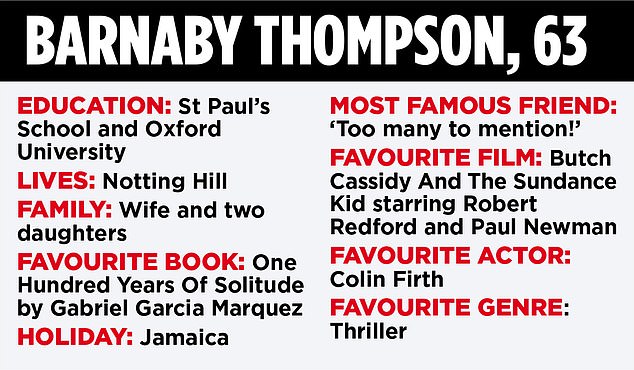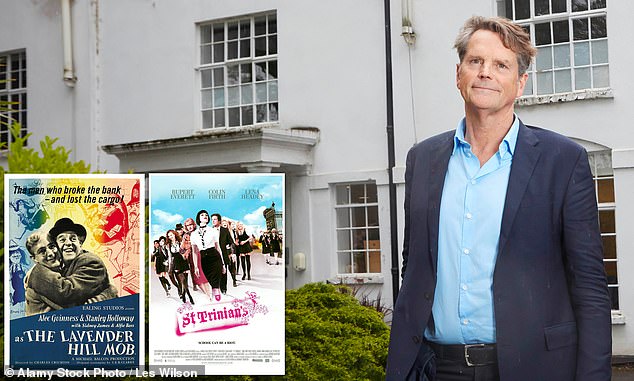Table of Contents
It could be a scene from a movie. It’s raining as director and producer Barnaby Thompson arrives at Ealing Studios on a bright blue Vespa. He steps off the bike and removes all his motorcycle gear to reveal a sleek suit, a transformation akin to Superman turning into Clark Kent – or in this case, the guy behind the camera.
Thompson, 63, has been at the heart of British cinema for almost three decades. Among other things, he is the creative force behind films such as Spiceworld, the remake of St Trinian’s and the 2002 version of Oscar Wilde’s The Importance of Being Earnest.
For the past 23 years he has been a co-owner of Ealing, the world’s oldest working film studio. In the early days of cinema in the early 20th century, the complex was known as the White House. The cameras have been rolling ever since 1902.
Thompson says his position carries with it a “real sense of responsibility” for the legacy and future of British cinema. As we walk to his office, he tells me that the room next door was used by one of his most famous predecessors, Michael Balcon, who ran the studios from 1938 to 1955, the years of the famous Ealing comedies such as The Lavender Hill Mob.
“I think Ealing Studios means a lot to a lot of people. If you talk to Martin Scorsese or Steven Spielberg about film, they’ll mention Ealing,” he says.
The Power of Ealing: Barnaby Thompson runs Ealing Studios, creator of classics such as The Lavender Hill Mob and the St Trinian’s series
He is a powerful advocate for the British film and television industry, which has boomed in recent years and made the UK one of the major centres outside of Hollywood.
He would like to see the new government take steps to protect and increase jobs and revenue generated by film production.
His call comes at a time when other prominent figures, including leading television producer Sir Peter Bazalgette, argue that the creative industries should be seen as a key source of economic growth. Generous tax incentives, including reduced corporate tax and the Enterprise Investment Scheme (EIS), have seen big US companies spending millions here that they could have spent elsewhere.
“London is a very attractive place,” he says, adding that top actors and technicians from around the world “love this city.” Incentive schemes are helping to give the UK an edge over cheaper European destinations such as Serbia. Belgrade has long been a hotspot for film thanks to low production costs and generous tax rebates for shooting there.
“If you had to choose between London and Belgrade, where would you like to spend your time?” he asks rhetorically.
But Thompson argues that there is an existential threat to what he considers “authentically British cinema”. By this he means productions by British companies that tell a quintessentially British story, such as ITV’s recent hit Mr Bates vs The Post Office. It tells a very British story to an audience that understands the nuances and politics of the drama.
And while investments by American actors are “fantastic for the economy and jobs,” they also have their risks.
“There’s a balance to be found,” he says. American filmmakers pay a lot of money, which is good, but it makes it harder to make British films on a smaller budget.
“Independent” filmmakers, who as the name suggests operate without the backing of the major studios, still flock to Ealing for its wonderful history – if they can get their projects off the ground.
There is a question mark over future ventures. Thompson says: “Will The Full Monty be financed now? I don’t know. That’s the worry. These very English films can be hugely successful, but they may not seem to have that universal appeal at first.”

Since the pandemic, investors have become increasingly reluctant to take risks and invest in independent films. The EIS offers a 30% income tax reduction, which should make the bet more attractive, but recent changes have made it harder to rely on this system.
In 2023, £1.36bn was spent on 207 film productions in Britain, but only 11 per cent were made exclusively by British companies, according to data from the British Film Institute. As a result, it has been suggested that Hollywood titans should commit to producing more local content that tells national stories or employs local directors.
In 2021, France imposed levies and investment obligations on streaming services. These oblige media companies to invest at least 20 percent of their French net revenues in European works, of which 85 percent must be in projects of “French expression.”
But what constitutes national culture is often intangible and subjective, so introducing a similar system here would be tricky.
What is certain is that Ealing holds a special place in British hearts, as well as in the national film industry, due to post-war hits that remain popular today, such as The Ladykillers, Passport to Pimlico and Kind Hearts and Coronets.
In 1938, Balcon bought the land that now houses Ealing Studios. After establishing itself as a centre for warm, yet subtly subversive comedy, the site was bought by the BBC in 1955, who used it to film series such as Porridge, Monty Python and Doctor Who.
In 2001, the studios were acquired by a consortium including independent production company Fragile Films (headed by Thompson) and the Manhattan Loft Corporation, a property development group behind projects such as the Chiltern Firehouse and the St Pancras Renaissance Hotel.
Since then, it has been home to award-winning productions including Downton Abbey and Darkest Hour. Most recently, it was used for the Amy Winehouse biopic Back To Black. US private equity firm Starwood Capital bought a majority stake in the studios in 2022 for £48.5m.
That year, the studios unveiled plans for a £20m expansion. As we walk through the studios, which look more like a construction site than a cinema hub, Thompson praises the Los Angeles-based owners, who he calls “fantastic partners” and says “they don’t get involved in management”. The son of journalists, Thompson started out in documentary film, but his big break came in 1990 when he moved to New York, where he made the hit Wayne’s World.
When he returned to London, he produced Spiceworld and points out the spot where Victoria Beckham was dunked in a tank of water.
But last year’s Hollywood strikes by writers and actors were even “more disruptive” than the Covid strike, after an “incredible” ten years. The latest accounts show profits of £5.5m in 2022, compared with £5.6m in 2021. Figures for 2023, the year of the strike, have not yet been published.
In more than a century of filmmaking, Ealing has survived wars, economic depressions and all manner of political upheaval. Thompson is determined that whoever owns the studios, they will return to their glory days.
DIY INVESTMENT PLATFORMS

AJ Bell

AJ Bell
Easy investment and ready-to-use portfolios

Hargreaves Lansdown

Hargreaves Lansdown
Free investment ideas and fund trading

interactive investor

interactive investor
Flat rate investing from £4.99 per month

eToro

eToro
Stock Investing: Community of Over 30 Million

Trade 212

Trade 212
Free and commission-free stock trading per account
Affiliate links: If you purchase a product This is Money may earn a commission. These offers are chosen by our editorial team as we believe they are worth highlighting. This does not affect our editorial independence.
Compare the best investment account for you
Some links in this article may be affiliate links. If you click on them we may earn a small commission. This helps us fund This Is Money and keep it free to use. We do not write articles to promote products. We do not allow any commercial relationships to affect our editorial independence.


